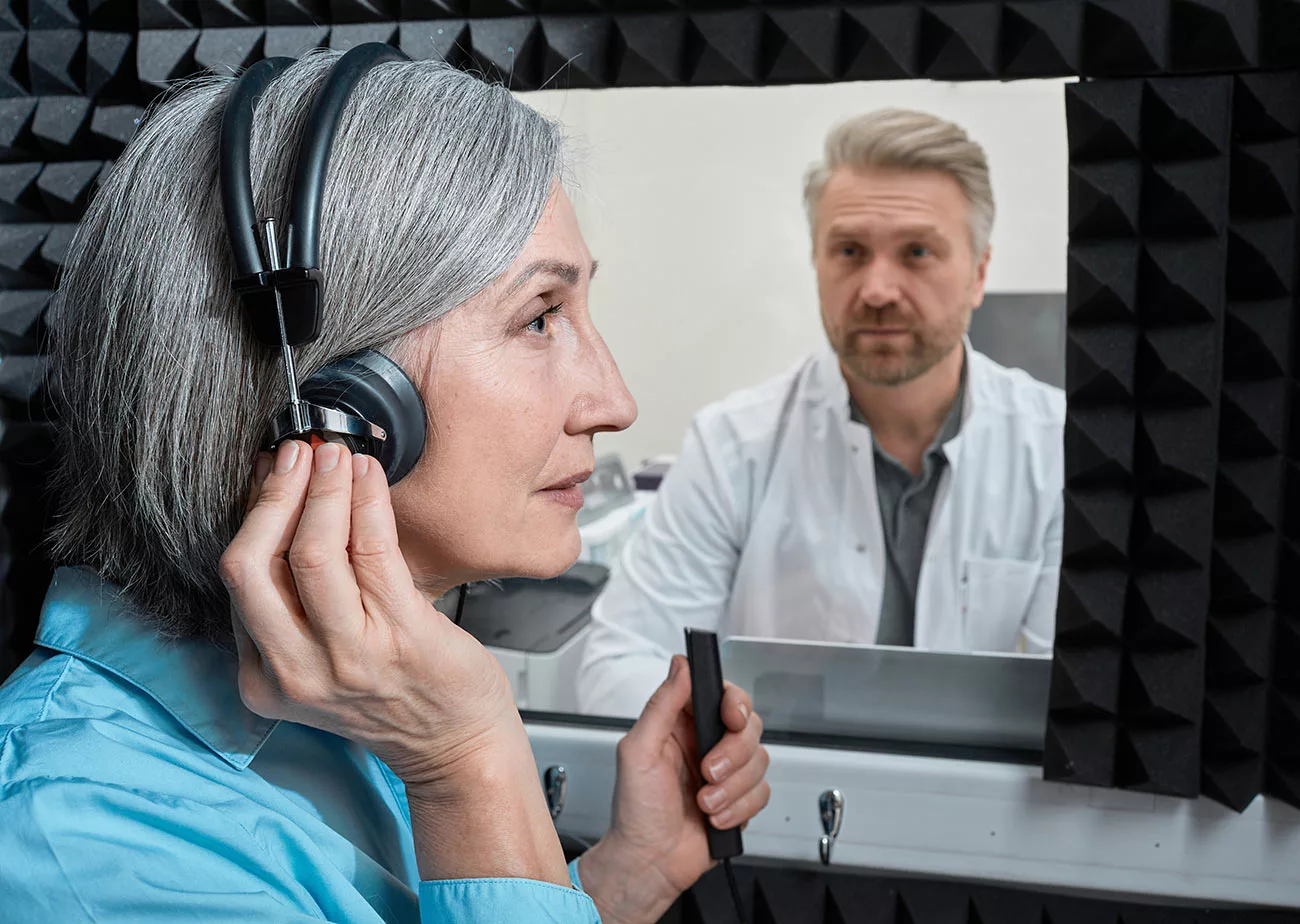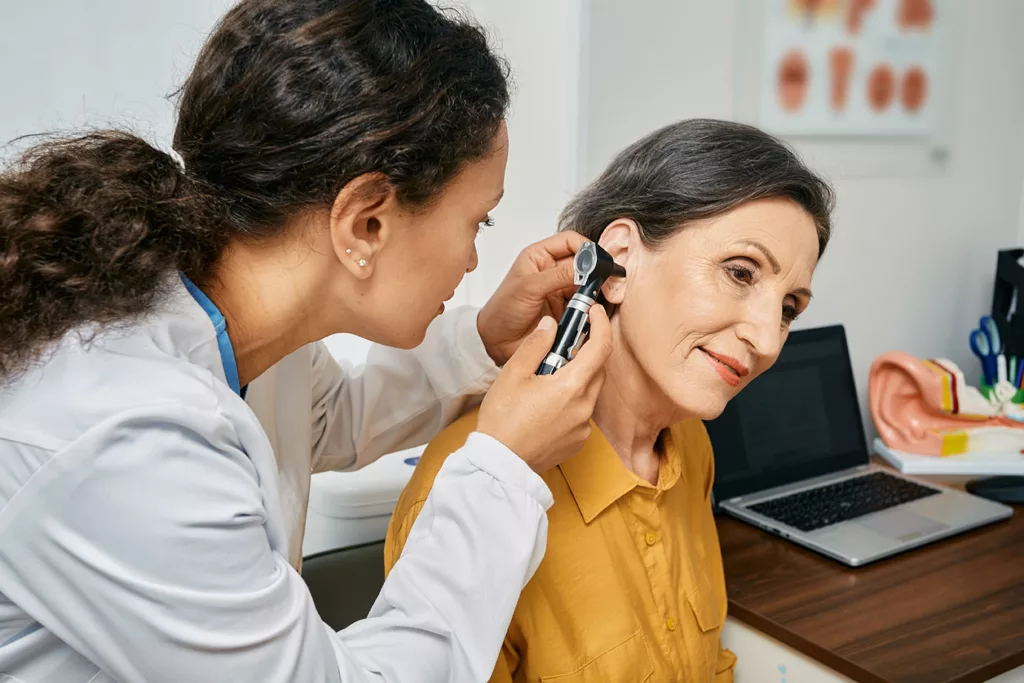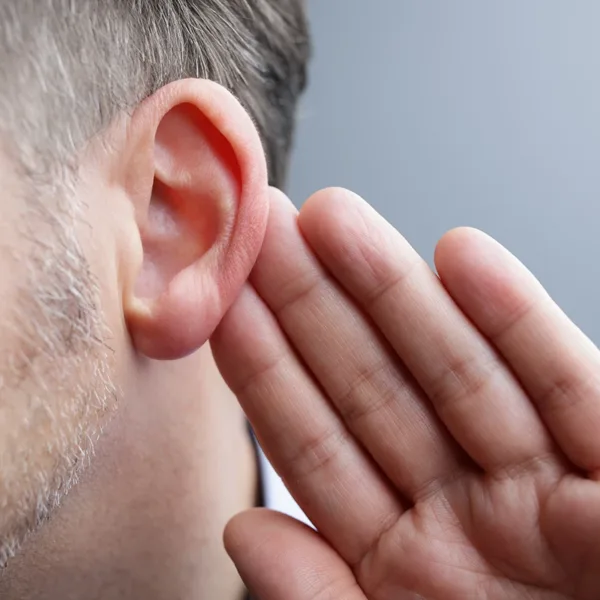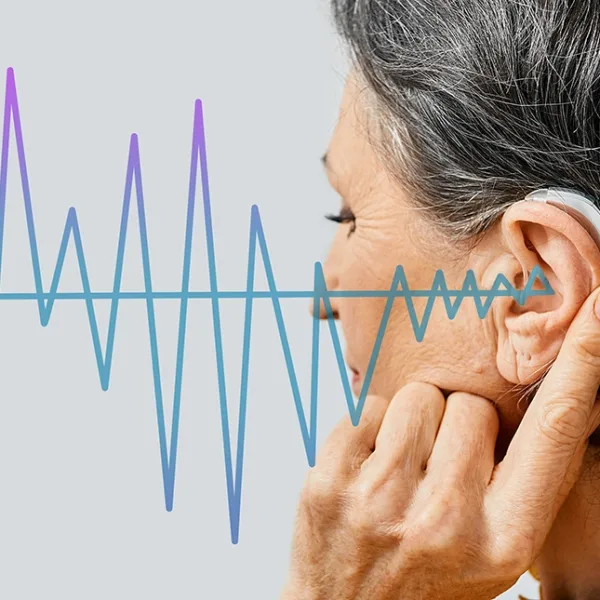
Hearing loss affects approximately 48 million adults in the United States alone.1 Scarier still, several studies have linked hearing loss to social isolation, depression, and even dementia. The sooner hearing loss is detected, the sooner a solution can be found to help you wholly engage in conversations and have the confidence that comes with fully accessing the soundscape of your life. Yet, in our busy lives, it can be easy to overlook the need for a routine hearing check-up. So, if you have ever wondered, “how often should I have my hearing tested?” this guide is for you.
In this article, we will explain how often you should get your hearing tested throughout your life, why checkups are so important, and what you can expect during your exam.
What Is a Hearing Test?
Hearing tests determine if you can access all frequencies of sounds audible to the human ear. If you have hearing loss, these exams will measure the degree to which you are unable to hear various frequencies so the best solutions for your needs can be determined. Comprehensive hearing exams are performed in a soundproof booth where you will use a clicker or verbally respond to indicate you can hear various tones and frequencies. You will also undergo a non-invasive ear exam and other tests, should they be required, to determine your type of hearing loss and its extent.
If you believe you are experiencing symptoms of losing your hearing, taking a self-guided test at home can help you assess if there is something wrong. For online hearing tests, you’ll need to listen in a quiet room, preferably with earbuds or headphones, though your computer speakers may also be used. You will respond to the queries and tones with your computer mouse or by pressing the buttons with your finger on a smartphone or other touchscreen device. The Audibel online hearing test does not require email registration and is fast and easy. You’ll be done in five minutes.
While self-guided hearing tests can provide some personal insight on potential changes in your hearing, it’s important to remember that they should only be used as a preliminary step before booking a comprehensive exam with a specialist. Only a hearing healthcare professional can provide you with an official diagnosis and an informed treatment plan specific to your type and degree of hearing loss.
When Should I Have My Hearing Tested?

Many forms of hearing loss happen gradually, and early signs can be passed off as being unusual circumstances. Even if you already have hearing aids, it’s important to monitor your hearing, as loss can be progressive. If you’re having trouble following conversations, hearing various forms of audio at a reasonable volume, or having difficulty hearing in noisy environments, it’s definitely a good idea to have your hearing checked. If you are experiencing any of the following symptoms, you probably should schedule a hearing exam:
- Dizziness or balance issues (your inner ear is linked to balance)
- Ringing, roaring, or whooshing sounds in one or more ears (tinnitus)
- Head trauma (after seeing a doctor)
- Fullness or pain in one or both ears
- Trouble detecting the direction from which sounds are coming
To ensure the longevity of your hearing and ear health, it’s important to have regular hearing exams even if you are not experiencing any symptoms. These routine exams will help you identify any gradual changes in your hearing and ensure a treatment plan can be implemented as soon as possible. The frequency with which you should have your hearing tested varies based on age, existing degree of loss, and how much exposure you typically have to loud noises.
Babies
According to the National Institute on Deafness and Other Communication Disorders (NIH), babies should have their hearing tested before coming home from the hospital, or no later than one month after being born.2
Children
If you have concerns about your child’s hearing, it’s important to talk to your pediatrician right away. If your child has any preexisting risk factors for hearing loss, speak with a hearing healthcare professional about how often they should have their hearing tested. Some forms of hereditary hearing loss may not begin to develop until later on in adolescence. Exposure to certain illnesses, or chronic ear infections in young children can also lead to gradual hearing loss during childhood. Other circumstances such as a head injury, exposure to loud noise, or ototoxic medications can also result in hearing loss in children. Through the age of 5, monitoring your child’s communication milestones can help indicate possible signs of hearing loss.
In fact, the NIH offers a helpful checklist to track your child’s hearing and communication milestones through age 5.
Adults 18-40
Adults 18-40 years old, who are in overall good health and who are not experiencing any symptoms of hearing loss, are typically advised to have their hearing tested every three to five years. Yearly hearing tests, or more frequent follow-up exams may be advisable if you experience any of the following:
- Frequent or prolonged exposure to loud noises that can cause noise-induced hearing loss
- Health issues that can cause hearing loss
- Prescription or over-the-counter ototoxic medication use
Adults 40-59
After the age of 40, experts recommend getting hearing tests every one to three years, and more often if you have symptoms, existing loss, or experience repeated exposure to loud noises. According to research reported by the NIH, 8% of American adults between the ages of 40 and 49 experience some level of hearing loss. Between the ages of 50 and 59, 23% of adults have some degree of hearing loss largely due to age.3 Age-related hearing loss, or presbycusis, and the accumulation of exposure to loud noises over time, make more frequent exams a good idea for this age range.
Seniors
With the increased likelihood of hearing loss with age, annual hearing health exams are generally recommended for anyone over 60. In the U.S., 39% of adults 60-69 years old experience hearing loss. That jumps to 77.2% in seniors 80-84, according to a 2020 study.4
People with Hearing Loss
If you have previously been diagnosed with hearing loss, it’s recommended that you come in for annual checkups to ensure that there are no changes to your hearing. Your hearing healthcare provider can also make sure that your hearing aid is in good working order and replace the batteries and filters as needed. Plus, with hearing technology advancing at a rapid rate, there may be a better solution available since your last visit.
People at Risk of Hearing Loss from Loud Noises

If you work in a job that exposes you to loud noises on a daily basis, your risk of noise-induced hearing loss (NIHL) is increased and so is your need for more frequent hearing health exams. In fact, in some occupations, yearly hearing tests are required and even provided by the employer, per OSHA requirements. If your lifestyle puts you at frequent risk of contracting NIHL, such as frequently attending concerts or sporting events, or engaging in loud leisure activities, annual hearing tests are a good idea as well.
Why Are Hearing Tests Important?

Many forms of hearing loss can develop gradually and be more difficult to detect without a professional hearing test. Since it’s so gradual, you may begin to accept a diminished level of hearing as normal. To ensure the longevity of your hearing health, and the overall quality of your wellbeing, early detection is important. The sooner your hearing loss is diagnosed, the sooner you can fully access all the beautiful nuances of all the sounds around you.
What Happens During a Hearing Test?

When you have your hearing professionally tested in a clinic, you can expect the following during your comprehensive hearing health exam:
Questionnaire
You will be asked questions to gather all the pertinent information about your overall health, lifestyle, and the levels of sounds or noise encountered in your career and leisure activities. This information will help your hearing specialist provide the most accurate diagnosis. Make sure to bring a list of medications you’re taking and be prepared to answer questions about your health and family history of hearing loss as well.
Physical Exam
Before testing your hearing, your specialist will conduct a physical examination of your ear with an otoscope. This medical device allows them to closely examine your ear canal and eardrum with as little discomfort as possible. This can rule out any obvious external damage and cerumen (ear wax) impaction that could be interfering with hearing acuity.
Measuring Hearing
Once the questionnaire and physical exam have been completed, you will be asked to play an active role in determining your hearing level. You will be seated in a comfortable soundproof booth and instructed to respond to tones and voices to determine how well you can hear specific sounds.
Invest in Your Hearing Today with a Hearing Exam at Audibel
Having regular hearing tests enables you to take control of your hearing health and maintain it for years to come. These proactive exams can also prevent other conditions commonly associated with hearing loss including isolation, depression, and dementia. We encourage you to schedule a hearing test at any of our hearing clinics conveniently located throughout the United States today. Our highly experienced specialists are here to ensure you continue to experience the joy of hearing!
1 “Hearing Loss Facts and Statistics,” Hearing Loss Association of America, https://www.hearingloss.org/wp-content/uploads/HLAA_HearingLoss_Facts_Statistics.pdf
2 “Your Baby’s Hearing Screening and Next Steps,” National Institute on Deafness and Other Communication Disorders (NIH), https://www.nidcd.nih.gov/health/your-babys-hearing-screening-and-next-steps
3 “Text Description for Infographic: New Study of Hearing Loss Among U.S. Adults Aged 20 to 69,” NIH, https://www.nidcd.nih.gov/about/hearing-loss-among-us-adults-aged-20-69-text-version
4 “Prevalence and Severity of Hearing Loss in the Older Old Population,” Sharma RK, Lalwani AK, Golub JS, JAMA Otolaryngol Head Neck Surg. 2020;146(8):762–763.doi:10.1001/jamaoto.2020.0900, https://jamanetwork.com/journals/jamaotolaryngology/article-abstract/2767717







Have a question or Comment?